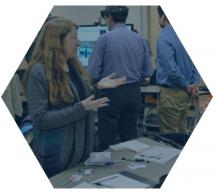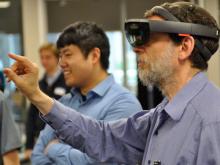Facilitate Effective and Innovative Teaching and Learning
Throughout the information-gathering process for this plan, stakeholders emphasized the importance of improving the reliability, ease-of-use and support of UTech on campus—in particular technology used in teaching and learning. For example, many faculty and students asked that UTech find ways to simplify technology’s use in classrooms. Constituents also urged UTech to concentrate on enhancing existing operations, rather than focus solely on acquiring and implementing new cutting-edge projects.
Success Stories
Working with the University Center for Innovation in Teaching and Education (U.C.I.T.E.), Kelvin Smith Library (KSL), Interactive Commons, think[box] and other campus partners, UTech promotes active learning, supports engaged student learning using digital technologies and focuses on student-centered learning approaches to extend the possibilities of classroom-based learning.
Four years ago, the Active Learning Initiative was created as a partnership between the Provost’s office and UTech to increase active student engagement. Initially, the program focused on creating innovative classroom spaces with mobile furniture and pod computers for collaboration. The initiative ultimately funded six rooms, which were so well received by faculty and students, that several professional schools added their own. An integral part of the success of the Active Learning Initiative, was a faculty fellowship—a year-long learning community dedicated to providing faculty with the support needed to redesign their courses to include increased student active engagement and effective use of technology both inside and outside of class. The Active Learning Fellowship continued for three years and provided training and support to a number of faculty members with hundreds of students participating in the initiative.
This past year, a pilot program, ActiveLearning+, expanded upon the original fellowship. As part of the ActiveLearning+ Fellowship, 10 faculty members were provided with resources needed to pursue cutting-edge ideas in active learning. These unique projects allowed faculty and UTech to partner with think[box] to design a 3D physical model to promote understanding of abstract mathematical concepts, as well as partnering with the Interactive Commons to develop learning modules in electromagnetism using the HoloLens augmented reality device.
Other projects included
- Adaptive and online learning courses in the School of Medicine
- Creation of videos to help students bridge chemistry courses and prepare for engineering labs
- Development of dentistry content experienced using the Aurasma app on mobile devices
- Digital storytelling in SAGES courses
- Exploration of virtual and augmented reality in learning-difficult neuroscience concepts
- Support of active learning in a class with more than 300 students in Strosacker
All faculty projects included students as co-creators, working side-by-side with faculty members to develop next generation learning tools and teaching approaches that will greatly influence the nature of education in the future. As part of the enhanced fellowship, faculty are giving back to the university community by sharing their stories with their peers and ensuring that the individual projects help promote innovation in teaching across campus.
After an extensive review of all the available vendor opportunities and possibilities, UTech worked collaboratively with the School of Medicine’s Medical Education curriculum team to utilize the Canvas learning management team in their transition from a home-grown system to Canvas and other systems.
This project engaged all areas of UTech for project management, business analysis, instructional design, educational technology, application program development, data management, security and deskside support teams.
- Led a major transition for the 3rd-year medical education students participating in their clerkship rotations at local hospital systems that will culminate in achieving a centralized, Canvas learning management system
- Assisted departments with the development of staff training, including a partnership with CWRU’s Compliance Office to create a more engaging 2017 Compliance Training module
- Presented at national conferences on the use of teaching with technology:
- Next Generation Learning Spaces Conference—supporting academic transformation with augmented reality
- New Media Consortium—faculty development and innovation
- Continued improvement of academic programs through the implementation and support of LiveText, a new software platform designed for outcomes assessment and ePortfolios
- Supported faculty grants and projects
- Presented or sponsored more than 15 faculty workshops across campus using technologies and strategies to support active face-to-face, hybrid and online courses
- Partnered with faculty to develop hybrid and online courses across campus to increase student engagement, including CWRU courses and the project-based Coursera Massive Open Online Course (MOOC), Take the Lead on Healthcare Quality Improvement
- Continued to provide leadership in active, hybrid and online learning, including:
- Co-hosting and presenting at the WICHE Cooperative for Educational Technologies State Authorization Compliance Workshop
- Working jointly with Compliance and Educational Student Services on accessibility
- Promoting faculty and staff membership in Quality Matters, a national non-profit organization that promotes the development of quality, student-centered course design
- Providing consultation to schools and departments interested in developing online courses and full programs
- Facilitated a 21st Century Learner Symposium Series to prepare the university for the next generation of learners:
- Canvas faculty panel and workshop
- Guest Speaker Jon Landis from Apple Inc.; Presentation: Education Mobility, Leadership + Learning
- Interactive poster session with Active Learning+ Fellows




